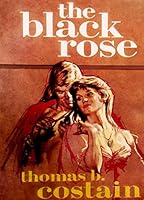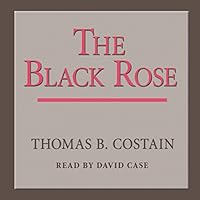- Welcome to FictionDB, Guest
- | My Account
- | Help

The Black Rose — Thomas B. Costain
buy the book from amazon
Paperback editions:
Hardcover editions:
eBook editions:
Audio editions:
Large Print editions:
Description
That these remarkable men adorned one span of years in what otherwise was a dark page of the Dark Ages was a chance not to be overlooked, and so I set myself the task of inventing a tale in which all three would figure prominently. However, the story which grew out of my efforts refused to be subordinated to the narration of history. It took the bit in its teeth and left me no chance to do more than introduce my three enthusiasms at rare intervals; but in spite of the fact that none of the illustrious trio appears except in brief scenes, their accomplishments dictate the direction of the story.
The story itself grows out of a legend, a most beguiling and romantic legend which is found in a very few old English histories. As I have endeavored to retain an element of surprise to the very end of the book, it would be highly inexpedient to relate here, before the story begins, just what this legend was. All I can afford to say, therefore, is that it concerns an English crusader, who later became the father of Thomas a Becket, and an Eastern girl who knew just two word of English. It is pure legend, of course, but it has always seemed to me too engaging a tale to be buried away between the covers of forgotten histories; and so I have borrowed it and adapted it to my needs.
It should be mentioned also that the incident of the imprisonment of the children in Bultaire Castle is based on a story from Scottish history which is mentioned briefly in Sir Walter Scott's 'Tales of a Grandfather.'
To forestall possible criticism I wish to say that I have not been "riving a bow beyond my reach" in the incident of the building of the ship in the Arsenal at Venice. Authentic records show that the urgent needs of the war with Turkey drove the Venetians to the construction of ships in a single day and that, moreover, they had conceived the idea of the assembly line, although they did not call it that. They were splendid ships that they built, great wooden biremes with towering superstructures and an imposing spread of sail. speed, it is clear, is not an invention of the present day.
CERTAIN CONTENT THAT APPEARS ON THIS PAGE COMES FROM AMAZON. THIS CONTENT IS PROVIDED ‘AS IS’ AND IS SUBJECT TO CHANGE OR REMOVAL AT ANY TIME.


 Amazon UK
Amazon UK